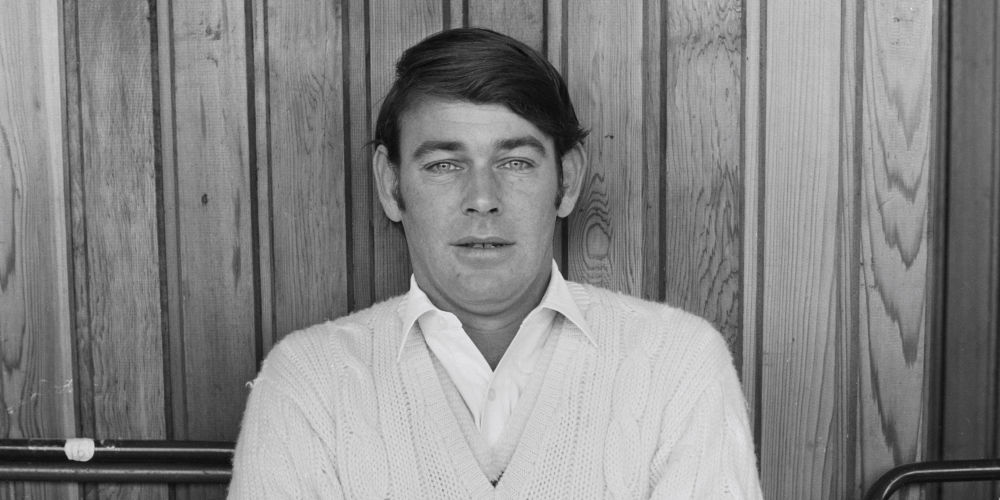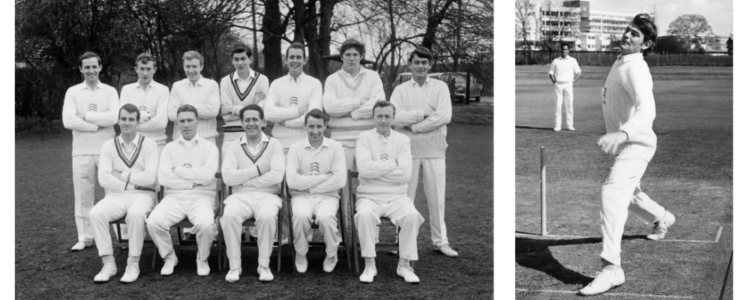
Essex Cricket was deeply saddened to learn of the passing of former player Robin Hobbs on Sunday morning at the age of 81.
A key member of the Essex squad during the 1960s and 70s, affable leg-spinner Robin made his debut in 1961 after being signed by the late Trevor Bailey, who also acted as his mentor during his career.
He went on to make 325 appearances for Essex between 1961 and 1975, taking 763 wickets at an average of exactly 26.00.
He played seven Test matches for England between 1967 and 1971, taking 12 wickets, and doing so as the last specialist leg-spinner for more than 20 years until Ian Salisbury debuted in 1992.
Capped by Essex in 1964, he received a benefit year a decade later before finishing his career at Glamorgan, whom he captained in the 1979 season.
Coincidentally, Robin’s best bowling figures of 8/63 were claimed for Essex against the Welsh county in 1966 at Swansea, and he went on to finish his career with a total of 1,099 wickets.
Born in Chippenham, Wiltshire on 08 May 1942 to Reg and Betty (née Dornhorst) Hobbs, Robin spent his early childhood in Scotland after his father, an RAF Flight Lieutenant, was posted to Dundee.
Following the end of the Second World War and his father’s decision to leave the RAF, the family settled in Dagenham, where Reg found work as a car salesman and a grocery shop owner.
Robin passed the 11-plus exam and attended Raine’s Foundation School in Stepney where he was first pushed towards playing cricket; he would go on to captain the school team before leaving in 1958.
He entered employment later that year, for the Employers Liability Insurance Company in London as a clerk, playing for the company as well as club sides Chadwell Heath and, latterly, Chingford.
Curiously, it was Kent who first offered Robin a route into playing county cricket, with the rule at the time being that they had to approach Essex, as Robin’s home county, for permission to sign him.
However, Essex had missed out on signing Robin’s namesake, the great Jack Hobbs, years earlier, and were not prepared to make the same mistake twice, especially on a man who shared his name.
Robin was signed up by Essex, achieving a long-held dream of becoming a professional cricketer, and made his 2nd XI debut against Leicestershire in May 1960.
There was some initial self-confessed frustration on Robin’s part, but with a turnover in the spin corps occurring in the winter of 1960-61, he pushed his way up the pecking order towards a First XI bow.
That arrived, against Leicestershire in May 1961 at Valentine’s Park in Ilford, before his very first Essex wicket came in the next game away to Gloucestershire in Stroud.
Robin’s England caps came at the peak of his powers in the late 1960s, taking in home contests against India and Pakistan, as well as touring both the latter and the West Indies.
His best return in the international arena was the 3/25 he collected on debut against India at Headingley in a six-wicket win for the hosts, before returning to county cricket after seven Tests.
Having established himself as one of Essex’s “spin triplets” alongside David Acfield and Ray East, Robin’s crowning glory came when he took his 1,000th first-class wicket in 1975.
Travelling to reigning county champions Worcestershire, Robin needed six further scalps to hit the landmark and after he took two in the first innings, the hosts were set 151 to win on the final day.
After he had tiptoed to the fateful 999 with three more, Worcestershire were eight down and still needing 50 to win. There was now next to no threat of an upset win to derail Robin’s day.
He reached the colossal milestone by bowling John Inchmore, before John Lever castled Brian Brain to confirm Essex’s first win of the season, providing the ideal backdrop to Robin’s achievement.
Later that year, he stunningly won the Walter Lawrence Trophy, awarded to the season’s fastest century, with a thrilling 46-ball effort against the touring Australians in August that saw him go from 50 to 100 in just 15 deliveries.
He was not known as a batter, and Rod Marsh, the visiting captain, is reported to have become so frustrated with Robin’s whirlwind performance that, when he was on 94, told him “You’ve had your fun, now get out or I’m going to bring [Jeff Thomson] back on.”
Robin promptly dispatched another six, the seventh of his innings, to reach a stunning century before being caught on the boundary – and all without having to face the terrifying Thomson again!

Having departed Essex at the conclusion of the 1975 season, he resurrected his career with a three-year spell in South Wales between 1979 and 1981.
Poetically, his final game of a long and distinguished career came in the county where it all began, away to Essex in Colchester in August 1981.
Naturally, he signed off from the game the only way he knew how, with a five-wicket haul; the 50th of his career.
Following retirement, Robin found employment back in the financial services sector with Barclays, alongside becoming a long-standing and valued member of Hutton Cricket Club.
His passion for cricket continued at Essex, coaching the age group sides from Under 12s to Under 15s for a period of time, whilst also being a familiar face with fellow Members and supporters during his regular visits to Chelmsford.
The thoughts of all at Essex Cricket are with Robin’s son Nick, and all of his family and friends.








